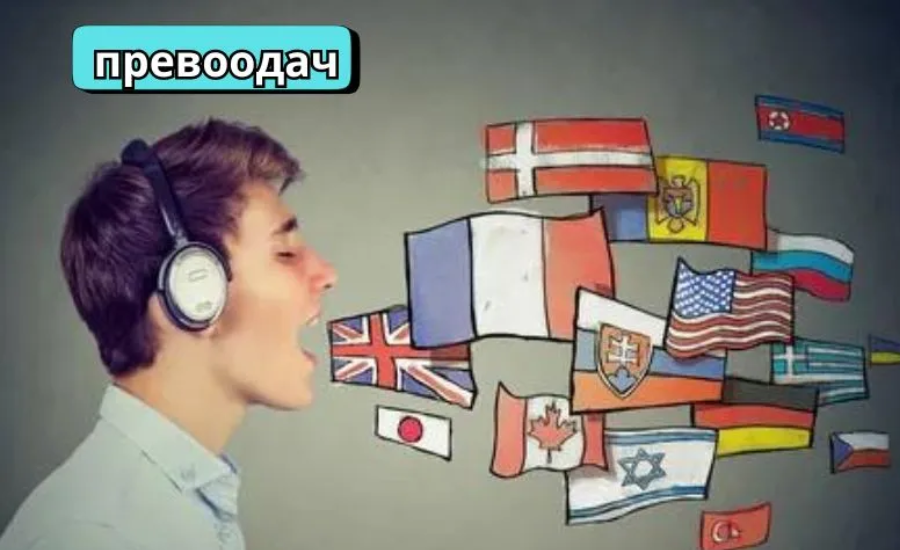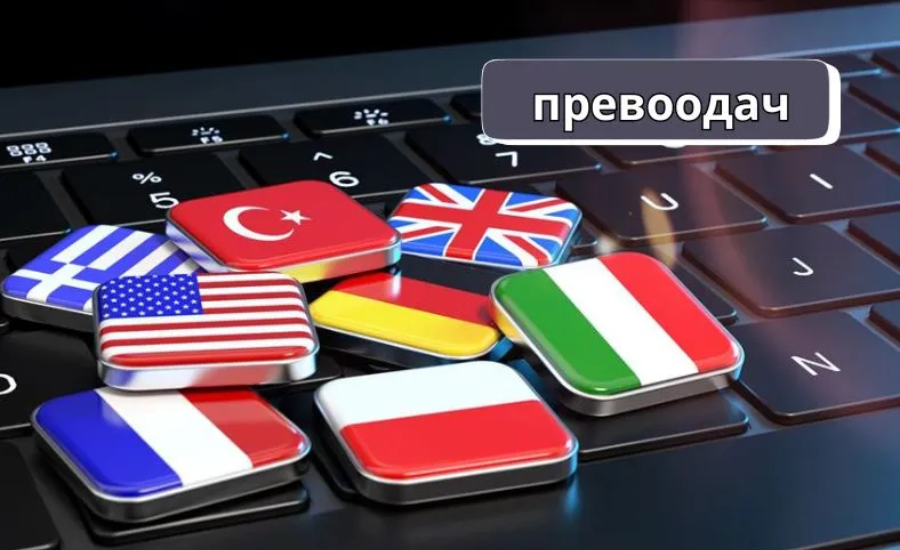A превоодач, or translator, is essential in today’s interconnected world, where communication across languages is increasingly necessary. They specialize in converting spoken or written words from one language to another, enabling people who speak different languages to understand each other. For instance, when someone speaks Spanish and the listener understands only English, a превоодач translates the Spanish words into English, facilitating effective communication. This role is vital in ensuring that individuals from diverse linguistic backgrounds can engage in meaningful exchanges, whether in personal conversations or professional settings.
Translating Texts: The Art of Conveying Culture

Beyond translating spoken language, превоодачи also works extensively with written texts. Their expertise allows them to translate books, articles, and various documents from one language to another. This process is not merely about converting words but also about capturing the essence of the original content. For example, a book written in French can reach a broader audience through a превоодач’s translation into English. This translation work is crucial in spreading knowledge, literature, and culture across different regions, making information accessible to people who might otherwise be excluded due to language barriers.
Ensuring Accuracy and Emotional Integrity in Translation
One of the most challenging aspects of a превоодач’s job is to maintain the original message’s meaning, tone, and emotional depth. Translation is not just about replacing words from one language with those of another; it requires a deep understanding of the context, cultural nuances, and emotional undertones. For example, idiomatic expressions or jokes in one language might lose their impact or meaning in another. A skilled превоодач must find ways to convey these elements authentically, ensuring that the translated message resonates with its new audience just as powerfully as it did in its original form. Their work is indispensable in various environments, from educational institutions to healthcare settings and international business, where clear and accurate communication is critical.
Breaking Down Language Barriers: The Essential Role of a Превоодач
A превоодач, or translator, plays a crucial role in facilitating communication across language barriers, ensuring that people from different linguistic backgrounds can interact seamlessly. By converting spoken or written words from one language to another, translators enable smooth conversations and mutual understanding. This skill is invaluable in our increasingly globalized world, where diverse languages and cultures intersect daily. Whether translating a simple conversation or complex text, the work of a преводач ensures that everyone involved can be both understood and heard.
Enhancing Travel Experiences with Translation Expertise
When traveling to a foreign country, not knowing the local language can make even simple tasks challenging. Whether you need help ordering food, asking for directions, or engaging in casual conversations with locals, a превоодач can make your experience more enjoyable and less stressful. They can translate your words into the local language and help you understand responses, allowing you to navigate new environments with ease. This service is invaluable for travelers, as it not only helps in overcoming language barriers but also enriches the travel experience by enabling more meaningful interactions with the local culture and people.
The Impact of Translators in Business Communication
In the business world, clear communication is essential for successful partnerships and deals, especially when companies from different countries collaborate. A преводач ensures that all parties understand each other’s contracts, goals, and instructions accurately. By translating important documents and facilitating communication, translators minimize the risk of misunderstandings and errors, leading to smoother collaborations and more effective negotiations. Their work is instrumental in bridging cultural and linguistic gaps, helping businesses achieve their objectives in a global marketplace.
Supporting Education Through Effective Translation
Education is another area where translators make a significant impact. In schools with students from diverse linguistic backgrounds, a превоодач helps ensure that all students have equal access to learning materials. By translating lessons, textbooks, and other educational content, translators enable students to learn effectively, regardless of the language they speak at home. This support is vital in fostering an inclusive learning environment where language differences do not become barriers to success. With the help of a превоодач, educational institutions can provide a more equitable and supportive experience for all students, helping them thrive academically.
The Importance of a Превоодач in Bridging Communication Gaps

A превоодач plays a crucial role in bridging communication gaps between people who speak different languages, ensuring that ideas and needs are clearly understood across linguistic boundaries. In our diverse world, interactions often involve individuals who do not share the same native language, and without a translator, these interactions could lead to confusion and missed opportunities. By facilitating clear communication, language specialists prevent misunderstandings and make it possible for people to effectively share their thoughts and collaborate.
In practical, everyday scenarios, the presence of a translator can significantly ease interactions. For example, when traveling to a foreign country, a language expert can assist with navigating unfamiliar surroundings, ordering meals, and engaging with locals. This support not only enhances the travel experience but also ensures that travelers can access basic services and feel more at ease in new environments. Without the help of a translator, such interactions could become frustrating or even overwhelming, potentially detracting from the enjoyment of the trip.
In professional settings, the expertise of a translator is essential for maintaining smooth business operations, particularly in companies that engage with international clients or partners. Translators ensure that contracts, emails, and meetings are accurately conveyed in a language that all parties can understand, minimizing the risk of miscommunication and errors. This accuracy fosters better collaboration and strengthens business relationships, ultimately leading to more successful projects and outcomes. Similarly, in educational environments, translators ensure that students who speak different languages receive the support they need to fully participate in class, promoting inclusivity and equal access to learning opportunities.
Essential Skills for a Successful Translator
To excel in the field of translation, a professional translator must possess a range of key skills that are critical for ensuring accuracy and effective communication. The foremost requirement is a profound command of both the source and target languages. This includes not only a robust vocabulary but also a thorough understanding of grammar, idiomatic expressions, and cultural contexts. Mastery in these areas enables translators to convey the intended meaning of the original message precisely, preserving its nuance and intent.
Attention to Detail and Communication Proficiency
Another vital skill for translators is meticulous attention to detail. This involves carefully analyzing both written and spoken content to avoid errors that could alter the message’s meaning. A translator’s ability to spot and correct subtle inaccuracies ensures that the translated material is both precise and coherent. Additionally, effective communication skills are crucial for addressing ambiguities and seeking clarifications when necessary. This helps in grasping the context and nuances of the source material, thus enhancing the quality of the translation.
Cultural Awareness and Research Abilities
Cultural knowledge is essential for translators to appropriately handle idiomatic expressions, humor, and cultural references in their work. Understanding the cultural backdrop of the languages involved helps ensure that translations are respectful and relevant to the target audience. Moreover, strong research skills are necessary for dealing with unfamiliar terms and concepts. The ability to quickly find and comprehend accurate information supports the translator in managing diverse topics and maintaining the high quality of their translations.
How Technology Enhances the Work of a Превоодач

In the modern landscape, technology plays a pivotal role in supporting a превоодач (translator) by increasing both efficiency and accuracy in translation tasks. Advanced tools such as translation software significantly expedite the translation process, converting text between languages with remarkable speed. These tools are often equipped with comprehensive dictionaries and extensive databases, offering instant access to essential terminology and linguistic resources. This technological assistance helps reduce the time spent on manual translation, enabling translators to focus on more complex aspects of their work.
Machine translation systems represent another technological advancement that aids a превоодач. Utilizing artificial intelligence, these systems can translate text and speech, providing a valuable starting point for translation projects. Although machine translations are not flawless and require human oversight, they are particularly beneficial for handling large volumes of content and quickly understanding the gist of information in various languages. This allows translators to process substantial amounts of material more efficiently.
Moreover, computer-assisted translation (CAT) tools offer significant advantages for managing translation projects. These tools maintain records of previously translated content and suggest consistent translations for recurring phrases, which is crucial for ensuring uniformity across extensive projects. CAT tools help translators manage quality and efficiency, freeing them to address more intricate elements of their assignments. Additionally, online platforms and cloud-based services facilitate collaboration among translators, allowing them to work together seamlessly from different locations, share resources, and provide real-time feedback. This collaborative approach enhances translation quality and ensures timely project completion.
Mastering the Art of Becoming a Skilled превоодач
Achieving proficiency as a превоодач (translator) involves more than mere language proficiency; it requires an in-depth grasp of both the source and target languages. Fluency in reading, writing, and speaking these languages is essential, but it’s equally important to immerse yourself in the nuances of grammar, idioms, and cultural contexts. This in-depth knowledge forms the foundation for translating messages accurately and effectively conveying the intended meaning. Without a thorough grasp of these elements, the essence of the original text can be lost in translation.
The Value of Formal Education in Translation
While natural language proficiency is crucial, formal education or specialized training in translation significantly enhances a превоодач’s capabilities. Numerous individuals aspiring to become translators opt for academic degrees or certifications in translation, linguistics, or similar disciplines. These programs not only teach essential translation techniques but also offer insights into industry best practices. Furthermore, formal training allows translators to specialize in specific fields, such as legal or medical translation, where specialized knowledge is imperative for accurate and effective translation.
Gaining Practical Experience: The Path to Expertise
Practical experience is indispensable in the journey to becoming a skilled превоодач. Beginning with small translation projects can help build a solid portfolio, showcasing your growing expertise. Volunteering to translate documents for non-profit organizations or offering translation services to friends and family are excellent ways to gain experience. Constructive feedback from seasoned professionals is invaluable, as it allows you to refine your techniques and address any areas needing improvement.
The Importance of Organization and Lifelong Learning
Success as a превоодач also hinges on strong organizational skills and meticulous attention to detail. Managing multiple projects, adhering to deadlines, and ensuring the accuracy of translations all require careful planning and focus. Utilizing tools like computer-assisted translation (CAT) software can help maintain consistency across various projects, making your work more efficient. Additionally, staying updated with the latest language trends and continuously learning is vital. Languages are dynamic, constantly evolving with new words and phrases. Engaging with language communities, attending workshops, and keeping abreast of translation advancements will ensure you remain relevant and continue to grow as a professional translator.
Exploring the Different Types of превоодач
In the diverse world of translation, different types of превоодач (translators) play specialized roles, each bringing unique strengths to the table. The most traditional and perhaps the most essential is the human translator. These professionals possess a deep understanding of both the source and target languages, as well as the cultures behind them. This expertise enables them to deliver translations that are not only accurate but also culturally sensitive, capturing the nuances and intended meanings of the original text. Human translators are particularly indispensable when dealing with complex materials that require a sophisticated level of interpretation.
The Rise of Machine Translation Systems
On the other end of the spectrum are machine translation systems, which have become increasingly popular due to their ability to quickly translate large volumes of text. Examples like Google Translate and Microsoft Translator are widely used for obtaining general translations in a matter of seconds. While these systems are incredibly efficient, they are not without their flaws. Machine translation often struggles with idiomatic expressions, cultural subtleties, and context-specific meanings, which can result in translations that lack accuracy or clarity. Although these tools are useful for getting the gist of a message, they often need human intervention to achieve high-quality translations.
The Role of Computer-Assisted Translation (CAT) Tools
Computer-assisted translation (CAT) tools represent a middle ground, providing invaluable support to human translators rather than attempting to replace them. These tools are designed to improve efficiency by storing previously translated content, which can be reused in future projects to maintain consistency. This feature is particularly useful in large, complex documents where uniformity is critical. CAT tools help translators manage large volumes of work without sacrificing quality, making them an essential resource for professionals engaged in extensive or ongoing translation tasks.
The Emergence of Hybrid Translation Systems
A more recent development in the field of translation is the hybrid system, which combines the strengths of both human and machine translation. In this approach, machine translation provides a preliminary translation, which is then refined and polished by a human translator. This method leverages the speed of machine systems while ensuring that the final product meets the high standards of accuracy and cultural relevance that only a human can provide. Hybrid systems are increasingly used in professional settings where both speed and quality are paramount, offering a balanced solution that maximizes the benefits of both human and machine expertise.
Where a превоодач Impacts Everyday Life

A превоодач (translator) plays a vital role in making global travel more accessible and enjoyable by bridging language gaps between tourists and locals. In the travel industry, these language experts are often found in tourist information centers, assisting visitors with understanding local customs, navigating unfamiliar environments, and interpreting menus. Whether through in-person services or translation apps, translators help travelers communicate effectively, ensuring that their experiences in foreign countries are as smooth and stress-free as possible. Their expertise is essential in helping tourists fully engage with the culture and people of the places they visit.
Enhancing Business Communication with Translation Services
In the corporate world, a превоодач is indispensable for companies engaged in international business. These professionals facilitate clear communication between global clients and partners, ensuring that meetings, contracts, and marketing materials are accurately translated. By doing so, they help prevent misunderstandings that could jeopardize business relationships or lead to costly errors. Translators in business settings play a crucial role in the smooth execution of international transactions, helping companies navigate the complexities of working across different languages and cultural contexts.
Supporting Education Through Translation
Educational institutions rely heavily on the skills of a превоодач to ensure that all students, regardless of their native language, have equal access to learning. Translators in schools and universities help translate educational materials, assist with classroom instructions, and provide crucial support during exams. Their work ensures that language barriers do not hinder a student’s ability to succeed academically. By making education more inclusive, translators contribute to a learning environment where all students can thrive, regardless of their linguistic background.
Critical Translation Services in Legal and Medical Fields
The legal and medical fields are two areas where the expertise of a превоодач is particularly critical. In legal settings, translators ensure that documents such as contracts, court proceedings, and legal briefs are accurately translated, which is essential for upholding justice and ensuring fair outcomes. In the healthcare sector, translators assist with patient consultations, translating medical records, and conveying treatment plans. Their work is vital in ensuring that patients receive the correct care and fully understand their medical situations, which can be life-saving in critical situations.
Challenges Faced by a превоодач in Modern Translation
Navigating Language Nuances and Cultural Sensitivity
A превоодач (translator) often encounters significant challenges, starting with the intricacies of language nuances and idiomatic expressions. Languages are rich with idioms, slang, and cultural references that may not have direct equivalents in other languages. Translators must creatively convey the same meaning without losing the original essence or causing misunderstandings. This requires not only linguistic expertise but also a deep cultural awareness to ensure that translations are both accurate and meaningful. The ability to navigate these complexities is a testament to the skill and knowledge required in the translation profession.
Balancing Workload and Meeting Deadlines
Another demanding aspect of a превоодач’s role is managing a high volume of work while adhering to tight deadlines. Translators often juggle multiple projects at once, each with its unique challenges and timelines. This requires exceptional time management skills to ensure that all tasks are completed on schedule without sacrificing quality. The pressure to deliver precise translations within short time frames can be intense, making effective prioritization and organization essential for success in this field.
Ensuring Consistency in Large-Scale Projects
Maintaining consistency is crucial, especially when working on large or ongoing translation projects. Translators must ensure that specific terms and phrases are translated uniformly across the entire document. Inconsistent terminology can undermine the clarity and professionalism of the translation, affecting its overall quality. To manage this, translators often rely on tools and strategies that help maintain consistency, such as glossaries and computer-assisted translation (CAT) tools. These resources are vital in delivering a polished and cohesive final product.
Adapting to Evolving Languages and Technology
Finally, staying current with the ever-evolving nature of languages and advancements in translation technology poses an ongoing challenge for a превоодач. Languages are dynamic, continually evolving with new words, phrases, and usage patterns. To provide accurate translations, translators must remain lifelong learners, continually updating their knowledge and skills. Additionally, as new translation tools and software emerge, mastering these technologies becomes essential. Continuous adaptation to both linguistic changes and technological advancements ensures that translators can meet the demands of a rapidly changing world.
The Essential Role of a Превоодач in Bridging Cultural and Language Gaps

A превоодач (translator) plays an essential role in connecting cultures by enabling communication between people who speak different languages. Their expertise allows individuals to understand and connect with each other, even when language barriers exist. In our increasingly globalized society, where cross-cultural interactions are more common than ever, translators do more than just convert words; they also translate cultural nuances, fostering mutual understanding and respect. Their work is crucial in breaking down communication barriers and helping people from different backgrounds connect on a deeper level.
In the realm of international business, translators are indispensable for navigating cultural differences and ensuring effective communication. They translate marketing materials, contracts, and business communications, ensuring that messages are not only clear but also culturally appropriate for different audiences. This precision is vital for companies looking to expand into new markets and build strong relationships with global partners. Accurate translation helps prevent misunderstandings and ensures that business transactions and negotiations proceed smoothly, ultimately contributing to the success of international ventures.
On a more personal level, language specialists play a critical role in facilitating communication in various everyday situations, such as travel, legal matters, and healthcare. By translating conversations, documents, and medical information, they help individuals overcome language barriers and access essential services. This support can be life-changing, ensuring that everyone’s needs are met and that people feel understood and respected, regardless of their language. The work of translators extends beyond mere words—they must navigate cultural sensitivities and nuances to convey messages accurately and respectfully, acting as a bridge that connects people from diverse backgrounds and helps create a more inclusive world.
The Evolving Future of Translators
The future of the превоодач (translator) profession is set to undergo significant changes due to technological progress and evolving global demands. A major development is the integration of artificial intelligence (AI) and machine learning into translation tools. These advanced AI-driven systems are enhancing translation efficiency and accuracy by processing large amounts of text and continuously improving through sophisticated algorithms. Despite these technological advancements, human translators will remain essential. Their expertise in understanding context, cultural nuances, and idiomatic expressions ensures a depth of interpretation that technology alone cannot match.
Another trend is the growing need for specialized translation services. As international communication expands, there is an increasing demand for translators with expertise in specific fields such as legal, medical, and technical areas. Accurate translation of complex documents requires in-depth knowledge of these domains to ensure precision and reliability. This trend is expected to lead more translators to focus on niche specializations, thereby refining their skills to meet diverse industry needs.
The shift toward remote work and digital collaboration is also reshaping the translation industry. With the rise of online communication tools, translators now have the flexibility to work from anywhere, enabling them to collaborate more effectively with clients and colleagues around the world. This digital shift opens up opportunities for international projects and enhances the ability to manage and complete complex assignments in real time.
Conclusion
In conclusion, the role of a превоодач, or translator, is more crucial than ever in our increasingly interconnected world. As technology advances, including the rise of AI and machine learning, translators will need to blend these innovations with their irreplaceable human skills. Their ability to interpret cultural nuances, idiomatic expressions, and contextual subtleties ensures that communication remains clear and meaningful. Specialization in various fields and the shift towards remote work further highlight the evolving nature of translation. As global interactions and demands for real-time translation grow, the future of a преводач will involve balancing technological tools with the rich, human touch essential for bridging language and cultural gaps.
Read More: Dee Forbes

